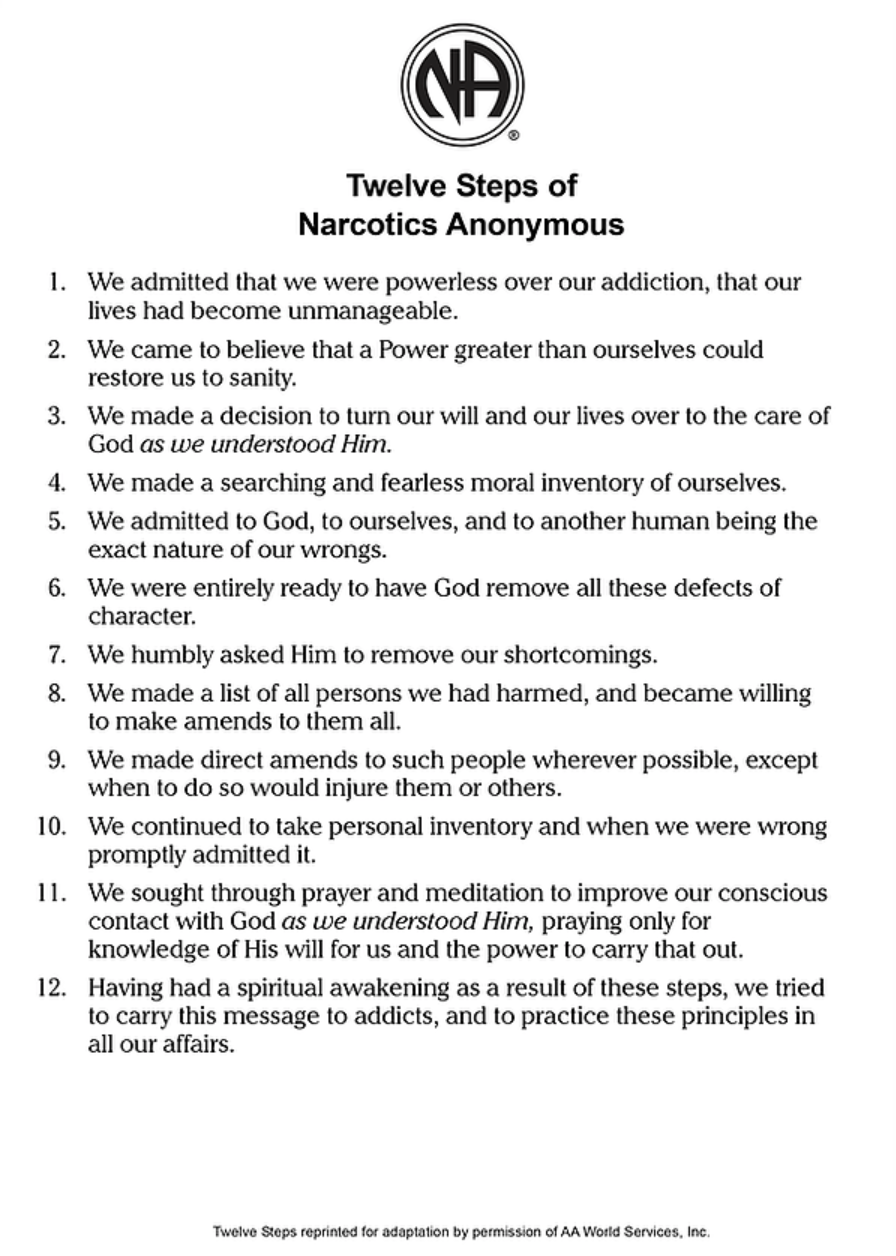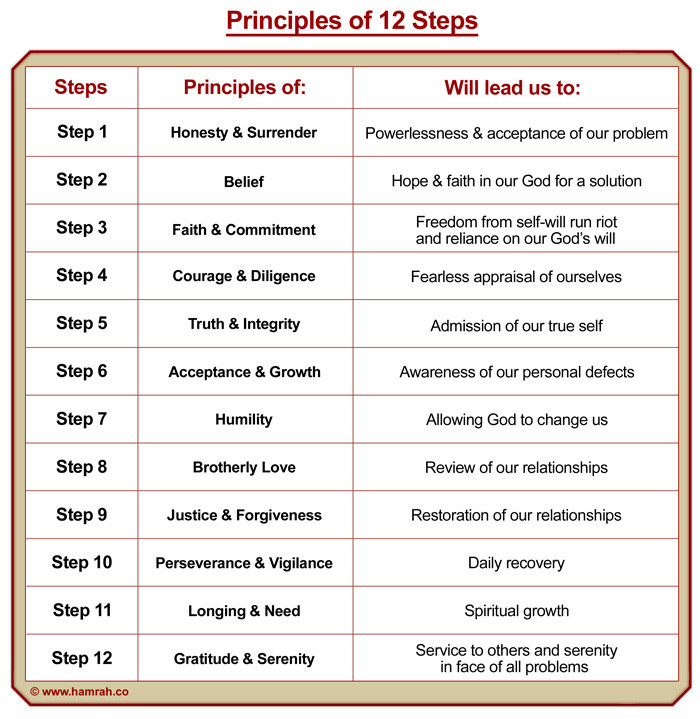The 12 Steps and Twelve Traditions of Alcoholics Anonymous (AA) have long been an integral part of recovery for many individuals. These principles serve as a guide for those seeking to overcome addiction and find a path to a healthier, more fulfilling life. In this post, we will explore the significance of these steps and traditions, as well as highlight some helpful resources for those interested in learning more.
Step 1: We admitted we were powerless over alcohol—that our lives had become unmanageable.
 The first step of the 12 Steps acknowledges the need for individuals to recognize their powerlessness over alcohol or any other addictive substance. It is a humbling admission that opens the door to seeking help and support.
The first step of the 12 Steps acknowledges the need for individuals to recognize their powerlessness over alcohol or any other addictive substance. It is a humbling admission that opens the door to seeking help and support.
Step 2: Came to believe that a Power greater than ourselves could restore us to sanity.
 This step encourages individuals to acknowledge the presence of a higher power that can offer guidance and support in their journey toward recovery. It is a step that instills hope and emphasizes the importance of faith.
This step encourages individuals to acknowledge the presence of a higher power that can offer guidance and support in their journey toward recovery. It is a step that instills hope and emphasizes the importance of faith.
Step 3: Made a decision to turn our will and our lives over to the care of God as we understood Him.
 Step 3 asks individuals to surrender their control and trust in a higher power, however they may define it. It is a step that focuses on letting go of personal ego and allowing a higher power to guide their actions and decisions.
Step 3 asks individuals to surrender their control and trust in a higher power, however they may define it. It is a step that focuses on letting go of personal ego and allowing a higher power to guide their actions and decisions.
Step 4: Made a searching and fearless moral inventory of ourselves.
 This step requires individuals to honestly assess their strengths and shortcomings. It involves a thorough examination of one’s past behaviors, both positive and negative, in order to gain a deeper understanding of oneself and make amends where necessary.
This step requires individuals to honestly assess their strengths and shortcomings. It involves a thorough examination of one’s past behaviors, both positive and negative, in order to gain a deeper understanding of oneself and make amends where necessary.
Step 5: Admitted to God, to ourselves, and to another human being the exact nature of our wrongs.
 Step 5 emphasizes the importance of accountability and confession. By openly sharing the details of their wrongdoings and character defects, individuals can release the burden of guilt and find healing through the support and understanding of others.
Step 5 emphasizes the importance of accountability and confession. By openly sharing the details of their wrongdoings and character defects, individuals can release the burden of guilt and find healing through the support and understanding of others.
Step 6: Were entirely ready to have God remove all these defects of character.
 Step 6 focuses on the willingness to let go of negative traits and behaviors. It requires individuals to surrender their character defects to a higher power and embrace personal growth and transformation.
Step 6 focuses on the willingness to let go of negative traits and behaviors. It requires individuals to surrender their character defects to a higher power and embrace personal growth and transformation.
Step 7: Humbly asked Him to remove our shortcomings.
 In Step 7, individuals surrender their shortcomings to the care of a higher power and ask for guidance in overcoming these limitations. It is a step that promotes humility and self-awareness.
In Step 7, individuals surrender their shortcomings to the care of a higher power and ask for guidance in overcoming these limitations. It is a step that promotes humility and self-awareness.
Step 8: Made a list of all persons we had harmed and became willing to make amends to them all.
 This step involves acknowledging the harm caused to others during one’s addiction and making a commitment to make amends. It is a step that emphasizes the importance of taking responsibility and seeking forgiveness from those who have been affected.
This step involves acknowledging the harm caused to others during one’s addiction and making a commitment to make amends. It is a step that emphasizes the importance of taking responsibility and seeking forgiveness from those who have been affected.
Step 9: Made direct amends to such people wherever possible, except when to do so would injure them or others.
 Step 9 requires individuals to take direct action in making amends to those they have harmed, whenever it is possible and safe to do so. It is a step that promotes healing and rebuilding relationships.
Step 9 requires individuals to take direct action in making amends to those they have harmed, whenever it is possible and safe to do so. It is a step that promotes healing and rebuilding relationships.
Step 10: Continued to take personal inventory and when we were wrong promptly admitted it.
 Step 10 involves ongoing self-reflection and accountability. It encourages individuals to regularly assess their thoughts, actions, and behaviors and take responsibility for any wrongdoing. Prompt admission and amends are essential components of this step.
Step 10 involves ongoing self-reflection and accountability. It encourages individuals to regularly assess their thoughts, actions, and behaviors and take responsibility for any wrongdoing. Prompt admission and amends are essential components of this step.
Step 11: Sought through prayer and meditation to improve our conscious contact with God as we understood Him, praying only for knowledge of His will for us and the power to carry that out.
Step 11 emphasizes the importance of spiritual practices such as prayer and meditation. By seeking a deeper connection with a higher power, individuals can find guidance and strength to navigate life’s challenges and make choices aligned with their higher purpose.
Step 12: Having had a spiritual awakening as the result of these steps, we tried to carry this message to alcoholics and to practice these principles in all our affairs.
The final step calls upon individuals who have experienced a spiritual awakening through the 12 Steps to share their experience, strength, and hope with others who are struggling with addiction. It is a step that encourages individuals to embody the principles of the 12 Steps in all aspects of their lives and serve as a beacon of hope for those in need.
In conclusion, the 12 Steps and Twelve Traditions of Alcoholics Anonymous offer a time-tested guide for individuals seeking recovery from addiction. These principles provide a framework for personal growth, self-reflection, and spiritual transformation. By following these steps and incorporating them into daily life, individuals can find the strength and support needed to overcome addiction and achieve lasting recovery. If you are interested in learning more about the 12 Steps and Twelve Traditions, there are numerous resources available online and through local AA groups. Remember, you are not alone in your journey, and there is always hope for a brighter future.